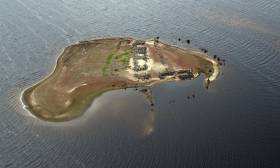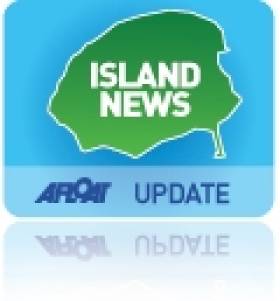Displaying items by tag: Drought
Inland waterways in Ghent and other popular areas in the Flanders region of Belgium have been effectively closed to pleasure boating as a result of historic drought conditions across continental Europe.
Marine Industry News reports on the move by Flemish Waterways, which has declared that leisure vessels may only pass through locks alongside commercial traffic.
“In concrete terms, this means that pleasure craft are no longer possible on waterways with very little or no commercial shipping,” Flemish Waterways said in a statement.
The organisation adds that recent heavy rains and forecasted rainfall will not be enough to restore its watercourses to safety navigable levels any time soon.
Moreover, there are growing concerns about water supply throughout Belgium with use restrictions being mooted for next month as the drought continues.
Marine Industry News has more on the story HERE.
Flooded Homestead Re-emerges From Wicklow Reservoir
#Poulaphuca - The remains of an old homestead submerged by the Poulaphuca Reservoir have resurfaced, as RTÉ News reports.
Images captured by the Garda Air Support Unit in Wicklow clearly show the ruins of a house and a piece of farm machinery.
The ‘island’ was revealed by the retreat of reservoir waters in the recent summer drought that saw remarkable archaeological finds nationwide — as well as an ‘ÉIRE’ sign on Bray Head dating from the Second World War.
While patrolling the Wicklow division The Garda Air Support Unit noticed the ruins of a homestead and a piece of farm machinery (mowing bar) on a raised piece of land which had previously been submerges in the lakes. pic.twitter.com/JIco4vlgit
— An Garda Síochána (@GardaTraffic) September 14, 2018
The farm was one of a number of properties abandoned before the valley was flooded to create Poulaphuca in 1940.
Possible 'Underground' Solution To Aran Islands Water Shortage
#AranIslands - 'Water, water everywhere, nor any drop to drink' has never been more true for residents of the Aran Islands who are facing their worst ever water shortage.
Now BreakingNews.ie reports on a call on Irish Water to tap into the newly discovered network of underground rivers believed to run beneath the islands and throughout Galway Bay to provide a lifeline for Aran's communities.
Tiernan Henry from NUI Galway's Earth and Ocean Sciences department says geological surveys for the freshwater aquifier systems believed to extend throughout the bay could lead to an invaluable source of fresh water for people on Inis Mean and Inis Oirr in particular, who have been forced to use water brought in from the mainland at great expense – around €1 per litre.
BreakingNews.ie has much more on the story HERE.
To Russia with ‘Potatoes’
Asides the cash crop, Drogheda Port has established shipping trades routes in the carriage of containers units, fertilizers, magnesite, LPG and newsprint. In addition the Co. Louth port operates the country's only weekly service to Norway, Sweden and Denmark.






























































